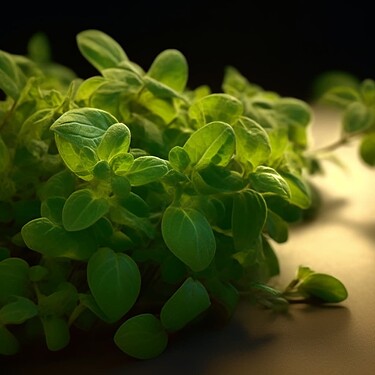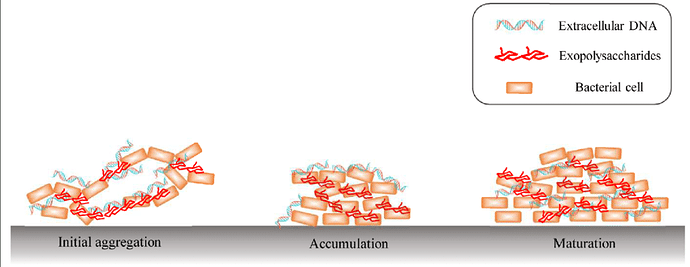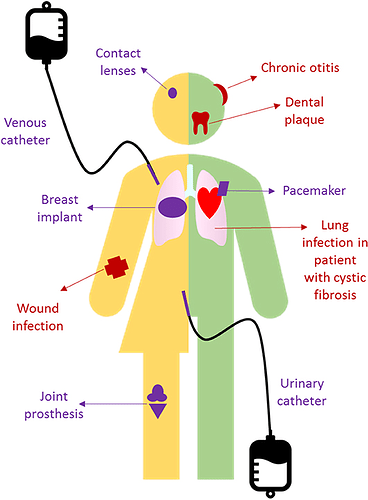Wikipedia explains what phytochemicals (such as carvacrol) are:
Phytochemicals are chemical compounds produced by plants, generally to help them resist fungi, bacteria and plant virus infections, and also consumption by insects and other animals.
Carvacrol, or cymophenol, is a monoterpenoid phenol with a characteristic pungent, warm odour of oregano. I’ll talk about one of its mechanisms of actions that works against microbes that form biofilms.
What biofilms are
Fig 7 - available from: BMC Microbiology | from https://www.researchgate.net/figure/Proposed-model-for-how-extracellular-DNA-eDNA-exopolysaccharide-EPS-interaction_fig4_341388640
You can think of animals as having different “modes”, such as their hibernation mode and normal mode of living. Bacteria and fungi also have different modes. Some of them will follow a biofilm strategy where they will be highly defensive and sit inside their biofilm fortress. Some of the things that they do in this strategy include:
- Sticking/anchoring themselves to a surface at all costs, preventing them from being washed away.
- Building a biofilm structure around themselves that will protect them against threats such as antibiotics, antibodies, etc. To build the struts of this structure, they will squirt out extracellular DNA to give a frame for the biofilm (eDNA is mentioned in the diagram above).
- Slowing down their metabolism, which helps protect them against many chemical poisons.
- Communicating with other microbes in the same colony. This is called quorum sensing.
Quorum sensing or quorum signaling is the ability to detect and respond to cell population density by gene regulation. The microbes in a biofilm communicate to each other to tell other microbes to stay in the biofilm mode, which protects them against their environment. If they don’t form biofilms in the first place, then they are vulnerable to being wiped out by antibiotics, antibodies, your immune system’s cells, etc.
Carvacrol is known to disrupt quorum sensing (QS).
Some essential oils have been shown to inhibit QS in bacteria and this has been proposed as a mechanism of their antibacterial activity [5]. Previous studies have shown that sub-lethal concentrations of carvacrol, a component of oregano essential oil, reduce motility and invasiveness in bacteria [6]–[7]. This antimicrobial compound can reduce biofilm formation in staphylococci and Salmonella strains [8]–[9].
This should help your body fight off the types of bacteria that are vulnerable to this chemical angle of attack.
Biofilms grow inside us
The diagram below shows where biofilms can live inside our body:
from https://kids.frontiersin.org/articles/10.3389/frym.2020.00062
The diagram above is from an article titled Dangerous Slimes: How Bacterial Biofilms Make You Sick and How to Combat Them. So yes, biofilms can make you sick.
They are a serious health problem because antibiotics alone are not very good at wiping them out.
Carvacrol in the treatment of chronic illness
A few people (like myself) are reporting dramatic recovery due to black seed oil. Black seed oil happens to contain small amounts of carvacrol as part of its chemical cocktail (other chemicals include thymoquinone). See the following video or its slides (in the video description below the video) for data on what worked in people who (mostly) recovered:
Unfortunately, most people do not respond to black seed oil. So it may be useful to find treatments with similar mechanisms of action that may work in people who don’t respond to black seed oil. The overall pattern is that antimicrobials seem to work. People respond differently to them so patients would need to experiment to see what antimicrobial their body will respond positively to.
If the more established therapies fail, then it would be reasonable to look at safer antimicrobials such as oil of oregano. Oil of oregano has an excellent safety track record in healthy people because the supplement has been around for a while. Also, people eat oregano (which contains tiny amounts of its essential oils).
Oil of oregano supplements are available from supplement retailers like Amazon, iHerb, etc. See this post for an iHerb shopping list. Please be careful because all of the treatments that can deal with the root cause (in some people) seem to make the root cause worse in others.


